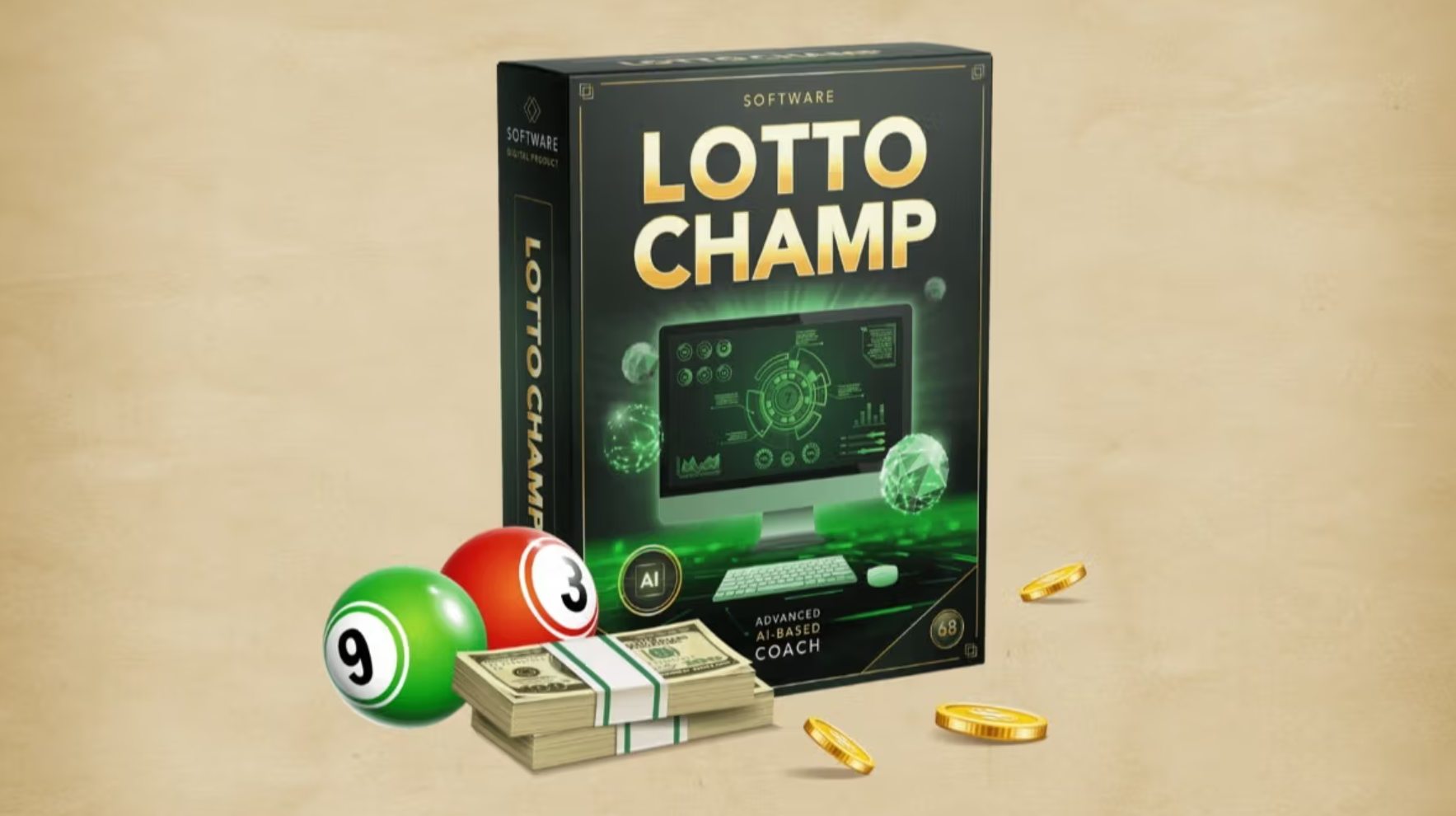Lotto Champ AI-Powered Lottery Software:
Would you like to win a lottery? I know it’s a silly question. Who doesn’t want to win a lottery? Luck is often attributed as the sole reason for lottery winning. It is true to a large extent. What if we can increase the odds of winning a lottery? The odds of winning are 1 out of 292 million . How can you improve your odds? Is it even possible to increase the odds? Yes, it is possible, with the help of Lotto Champ.
Quick Overview
Software Name: Lotto Champ
Version Number: 1.0.1
Developer: Lotto Champ INC.
Pricing: $197 (Lifetime Membership)
Refund Policy: 60 Day Money Back Guarantee
Bonus with product (Free eBooks):
- Bonus 1: Wealth and Lazy Easiest Ways to make Your Money Work for you and stay obscenely rich.
- Bonus 2: Ultimate Wealth Guard: How to Legally hide and protect your money from the government.
Contact Information: Contact@lottochamp-Product.com
Purpose of the Software: To improve the odds of winning a lottery
Technical Requirements for Lotto Champ
- Working Internet connection
- Smartphone/Laptop/Tablet
Lottery Mathematics behind Lotto Champ – Predictive analytics
Lotto Champ uses an AI-powered Combinatorics and probability machine. It uses a complex algorithm to estimate the number of possible outcomes. This data-driven technology uses the past winning numbers to come up with the probability of winning.
Recognizing the Common Pattern Between winning strings of numbers. The pattern is hidden, and it varies from lottery to lottery. There are too many. Lotto Champs, the super-intelligent AI-driven software, is able to calculate the best number by analyzing the pattern in real-time.
Lotto Chamo will ask for the zip code to determine the area and the lotteries available there. And depending upon your budget, you will receive the string of numbers that are most likely to win.
How to use the Lotto Champ? Detailed Instructions
- Step 1: Log in to the web app
- Step 2: You will be asked a few questions related to the lottery.
- Step 3: Fill the zip code. You will get the number of legal lotteries available in your zip code.
- Step 4: Fill the budget. People have a limit on spending on the lottery. Some like to go all in, while others keep it short and simple.
- Step 5: Submit the information.
Your work is almost done. The AI-powered app will collect all the data and start analyzing the odds of you buying the winning ticket. This process may take some time. It is analyzing thousands of gigabytes of data.
- Step 6: The analysis results will be displayed, telling you the odds of winning and finding the golden ticket.
Features
- Wide Compatibility: Lotto champs supports over 100 lotteries across the US, the UK, Europe, and Canada.
- Friendly Interface: Simple and intuitive, the process is straightforward. Accessible to beginners and experienced players alike.
- Data Driven Insights: Lotto Champs claims to update data twice every week. Allowing the prediction to be most accurate. This is also one of the key features of the AI-powered software.
- One-Time Purchase: At the moment, you can buy it by paying once. Future customers will be on the subscription-based model.
- MoneyBack-Guarantee: There is a 60-day money-back guarantee if you are not happy with the results.
Benefits of Using Lotto Champ
- Unique AI-Driven Number Filtering: There are certain numbers that are more likely to win, like 61, 32, 21, 63, 26, and 18 for Powerball. Lotto champs uses the past data to analyze a pattern, then combines it with user experience and location. The result is the list of numbers that are most likely to help secure a win. A lottery is a game of probability and combinations. This product, AI-powered software, increases your probability of winning.
- Global Compatibility: Lotto Champ supports the major international lotteries. Be it Powerball, Euromillions, or lotto, it will assist you in boosting the odds of winning.
- Friendly Interface: The interface is user-friendly, so anyone can use it. The instructions are clear. Anyone can use the instructions easily. You don’t need to learn anything. All you have to do is follow the instructions.
- Zero Learning Curve: As stated above, Lotto Champs has a user-friendly interface; anyone can use it without any assistance. And if you need any help, the helpline is available 24 hours a day, 7 days a week.
- Real-Time Time Data-Analysis: Lotto Champ database is updated twice a week. Allowing it to evolve and make better predictions.
Pros and cons of using Lotto Champ
- Important Things to keep in mind when using Lotto Champ
- Data-driven tolls for the lottery may or may not work. It is important to keep things realistic.
- No Guaranteed Wins: There is a system that can predict a win. All these AI-powered systems provide data-driven research that may or may not improve the chances of winning. The odds are always very slim.
- Stay Under Budget: The money you spend on the lottery should not affect other aspects of your life.
- Responsible Gambling: Gambling is addictive. It can ruin your mind and body. Even the lottery winners are not safe from its curse. Gambling is a form of entertainment, not an investment strategy.
Lotto Champ vs Gamma Stack and Lottery Ai
Lotto Champ has a relatively better user interface and a larger set of data compared to Gamma Stack and Lottery Ai. The Sheer quality of data sets apart lotto champs. The success rate with Lotto Champ is higher compared to other programs. As an investment, Lotto Champs is likely to give a positive ROI.
Lotto Champ Reviews and Complaints
The overall reviews of Lotto Champ are polarizing. Few people are happy with the results, and others are extremely unhappy with their results. And it is understandable, very few people are going to win and most are going to lose money in a lottery.
Frequently Asked Questions
Where to buy Lotto Champ?
Visit the Lotto Champ Official site to buy the product. It is an online exclusive software product.
Is it legal to use Lotto Champ?
Yes, it is 100% legal to use Lotto Champ. There are no regulations that limit the use of an AI-powered lottery winning system.
Can Beginners use Lotto Champ?
Yes, Beginners can use it. Lotto Champ is easy-to-use software.
Any Hidden fees associated with Lotto Champ?
No, hidden fees are charged. The software/App costs $197.
What are the six most common winning numbers?
As per CBS News, the most likely winning numbers for Powerball are 61, 32, 21, 63, 26, and 18.
Is it mathematically possible to predict a lottery?
It is possible to predict the probability of a given number. However, it is not possible to predict the exact winning number.
Can Lotto Champ help with sports betting?
Lotto Champs is made for the lottery system; it will not help with sports betting.

Bottom Line
Winning the lottery is a game of luck. The probability of you winning the lottery is slim. Lotto Champ is the way to boost the odds of winning. This AI-powered predictive analysis of lottery strings with historical data provides a lower risk and higher winning odds. Make no mistake, it is a software to improve the odds; it will not give you the exact winning number every time. Be realistic with your spending and goals. Gambling is for entertainment, not investment.
Disclaimer & Copyright
The content on AmericanPainSociety.org is provided for general informational purposes only and should not replace professional medical advice, diagnosis, or treatment. We make no guarantees of accuracy, completeness, or timeliness. Users rely on the information at their own risk. Always consult qualified professionals for healthcare decisions.
© 2025 American Pain Society. All rights reserved. No part of this website may be reproduced, distributed, or transmitted in any form or by any means without prior written permission.

